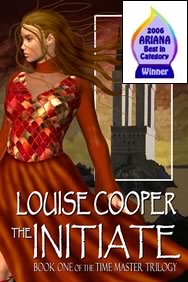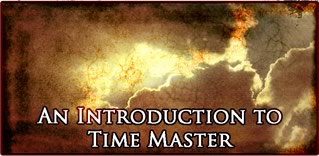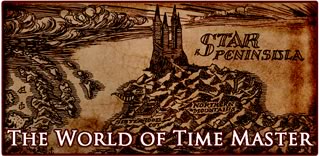Time Master>Introduction>The
Books>The World
The Time Master Books.
Lord Of No Time>Time Master>Star Shadow>Chaos Gate

THE INITIATE:
Chapter 1
With the dawning of the spring quarter-day, the wet weather that had plagued
Wishet Province since midwinter abated. Self-appointed sages who claimed to
have predicted the change pronounced it a good omen, and the inhabitants of
the province gave grateful thanks to Aeoris, greatest of the seven gods, for
the respite.
Today, following
a centuries-old tradition, every town and village in the land would be celebrating
the arrival of spring, and one small Wishet district, some seven miles inland
from the province capital, Port Summer, had prepared well in advance for the
lengthy ceremonies. As always a mass procession, headed by the Province Margrave
with a train of local elders and dignitaries, would parade through the town to
the river, where a ritual dressing and revering of wooden statues of the gods
would take place. Everyone from the highest to the lowest attended the quarter-day
rites—even the household of Estenya, an impoverished woman who lived with
her illegitimate son in the poorest part of the town, and depended on the grudging
charity of more fortunate members of her clan.
Today, Estenya
was more acutely aware than usual of her lowly status as she looked at her reflection
in the fly-specked mirror. Her dress—the best she possessed—was old
and had not been new when it came to her. Washing had shrunk the fabric until
the hem was barely below her calves, and the embroidered shawl that she wore
in an attempt to brighten the dress’s drabness was thin, and would do nothing
to keep out the bite of the east wind. But today appearance mattered more than
comfort; she would simply have to put up with the cold, if she wanted to avoid
disgracing her relatives at the festivities. Not, she reflected bitterly, that
they were likely to do more than curtly acknowledge her. She was the blot on
their immaculate record, the pretty and promising girl who had inexplicably fallen
from grace and had been paying the price ever since.
Estenya worked
her face into an expression that she hoped would disguise the lines which, at
thirty, were now beginning to mar her skin, and silently railed against the events
that had set her on this road twelve years ago. Then, exhausted by the birth,
over-emotional, she had pleaded to keep her son against family pressure to pass
him off as a servant’s child, and had won – at the price of her own
prospects. The boy had no father from whom to take a clan name as was traditional
for male children, and her family had flatly refused to bend the rules and grant
the baby the privilege of their own name. So from birth he was clanless; and
Estenya became, in effect, an outcast.
She had submitted
to the strictures willingly enough at first, but as time went by and the first
bloom of her youth faded while the boy, growing, seemed to become less and less
a part of herself, she began to bitterly regret the decision she had made. But
even if she could have been freed from the burden of the boy, she doubted that
any man would think her worth marrying now. There were too many younger, more
attractive women; women without a shameful past to hamper their chances. If
only, she thought to herself, if only I hadn't been such a fool!
A faint sound
suddenly impinged on her and she turned, then started with shock.
The boy had
opened the door and come into her bedroom so silently that she hadn't had
the least inkling of his presence. For all she knew, he might have been standing
there watching her in that inscrutable, unnerving way for ten minutes or more,
and as always his look suggested that he knew precisely what she was thinking.
Angrily, she
snapped at him. ‘How many times have I told you never to enter my room
in that way? Do you want to make me die of fright?’
‘I'm
sorry.’ The brilliance of the boy's strange, green eyes was masked momentarily
as he lowered his gaze. Looking at him, Estenya wondered how she could have given
birth to such a child. The established clans of Wishet shared certain similarities
of build and colouring, typified by the stockiness and sallow skin that Estenya
had inherited from both father and mother. But her son already outstripped
her in height, and his was a rangy, harsh-boned frame. His jet-black hair
curled in wild tangle to his shoulders, and the green eyes against his pale,
thin face gave him a disturbingly feline look. Perhaps he drew his genetic heritage
solely from his father… and always on the heels of that thought came its
unpleasant corollary: if she had known who his father was. There lay
the unhappy root of this whole unhappy affair; the fact that the identity of
the stranger whose ardent advances at a long ago Quarter Day celebration
she had been unable to resist was, and still remained, a mystery. One mistake
had caused her so much misery. And she couldn't even remember his face.
Now she looked
critically at her son. She didn't mean to be irritable and impatient with him,
she told herself; he could hardly be held to blame for her circumstances. None
the less the resentment was there, and surely anyone with any heart could understand
it.
‘You
haven't combed your hair,’ she accused. ‘You know how important it
is to look your best today. If you disgrace me…’ She let the threat
hang in the air unspoken.
‘Yes,
Mother.’ A flicker of near rebellion in the odd green eyes, but it was
gone almost before she could register it. As he turned to leave the room
she called after him,
‘And
you’re not to associate with Coran. Don't forget!’
Privately,
Estenya hated having to impose that restriction. Coran, her cousin's son,
was of an age with her own boy, and the only good friend he had. But Coran's
parents disapproved of more contact than was necessary with a bastard child,
whatever the blood relationship, and she dared not cross them. The boy didn't
answer her though she knew he had heard, and a minute later his footsteps clattered
down the uncarpeted stairs of the shabby and cramped house.
Estenya sighed.
She didn't know whether he would heed her warning; he had always been secretive,
but lately his mind had become a closed book to her. All she could do was hope,
and try to get through the day as best she could.
***
A large crowd was already gathering in and around the streets of the town as
the boy made his way towards the main square. He was glad to be free from the
stifling confines of his home, where he never seemed able to do anything right,
but at the same time he felt no enthusiasm for the day ahead. Despite the supposed
festivity of the occasion, a Quarter-Day tended to be a solemn and dull affair.
People were so preoccupied with their status and dignity that it seemed the true
nature of the celebration was lost. And today, with the sun tracing a low
arc in the sky and the last of the heavy-bellied clouds still hanging far away
inland, the rite promised to be gloomier than ever.
The procession
itself was just forming up as he reached the square, and the ritual drums had
begun their funereally slow and grave beat. The long crocodile of local councillors,
religiouses and elders, with the portly figure of the province Margrave at their
head, was bathed in a dull red radiance that was the best the heavens could provide
at this time of year, and even in this prosperous sector of the town everything
looked mean and small. The seven garlanded statues of the gods, swaying on their
litters above the heads of the procession, seemed grotesque and tawdry, showing
the wear and tear of age through the touched-up glory. The boy moved slowly among
the crowd, aware of his mother's earlier admonition not to make himself conspicuous,
and took up a stance at the entrance to a narrow alley that led into a maze of
back streets. Restless and uninterested in the proceedings, he was relieved when,
as he had half hoped, a voice hailed him.
‘Cousin!’
The boy's
face broke into a smile. ‘Coran!’ Instantly Estenya's warning
was forgotten as he shouldered his way through the press of people to join the
auburn-haired boy. The contrast between Coran's fine clothes and the handed-down
shirt, jerkin and trousers of his cousin was something that the boy tried,
usually with success, not to notice. The differences had never been a barrier
to friendship, and now Coran stood on tiptoe to whisper in his taller cousin's
ear.
‘Dull
as ever, isn't it? I tried to find some excuse for staying away, but Father wouldn't
hear of it.’
The boy’s
green eyes narrowed, and he smiled a wolfish smile. ‘We've attended, as
we were bidden. Isn't that enough?’
Coran looked
round hastily to see if anyone had overheard this invitation to rank disobedience. ‘We’ll
both be for a whipping if anyone finds out,’ he said uneasily.
The other
shrugged. ‘A whipping's soon over.’ He had suffered enough such punishments
for them to mean little to him now. ‘And if we go to the river, no one
will ever know we didn't follow the procession all the way.’
Coran hesitated,
less inclined to flout authority; but the temptation was too great to resist.
Together they slipped into the alley, weaving their way through the narrow lanes
until they reached the river jetty at the eastern end of the town. Here the main
rite would take place; the statues would be ceremonially washed in the sluggish
current to symbolize the rebirth of life within the land, and interminable speeches
would be made before the celebrations ended with music and stiff, formal
dancing.
Now though,
the jetty was deserted. Several small cargo boats, newly come upriver from Port
Summer, bobbed on the ebbing tide, and the black-haired boy squatted near the
water's edge gazing speculatively at the craft. He had often dreamed of escaping
from his present life, secretly boarding such a boat and sailing away to another
part of the world where no stigma would attach to his existence. No one would
miss him, for no one cared about him. He was an embarrassment, unwanted even
by his mother, so much so that he had no clan name and the forename Estenya had
given him was rarely used. In the solitude of his room he had invented another
name for himself, but no one knew of it, for he never spoke it aloud lest it
should be discovered and taken away. Yet the boy felt in his bones that he was,
somehow, special. It was the one lifeline that had kept up his lonely spirits
as he grew towards adolescence, and lately it had begun to goad him more and
more towards a half-formed idea of running away.
He would have
given much to see the world. He often walked the seven miles to Port Summer on
errands, and had been told that if he stood on the Port's high cliffs and strained
his eyes hard enough, he might just see the Summer Isle, home of the High Margrave
himself, lying in the hazy distance offshore. He had tried but he had never glimpsed
it. Nor had he ever seen what was said to be the most breathtaking sight in all
the world—the White Isle, far to the south where legend had it that Aeoris
himself, highest of the gods, had taken human incarnation to save his worshippers
from the forces of Chaos.
The boy had
an insatiable appetite for the mythology of his land; an appetite frustrated
by the fact that no one ever had the time or the patience to tell him what he
wanted to know. Oh, he had been taught to worship the gods, learned his catechisms,
said his prayers each night. But there was so much more he needed to
know. Sometimes the Quarter-Day festivities were attended by Sisters of Aeoris,
the religious women responsible for maintaining all the traditions of worship,
but he had never spoken to one of them, and anyway, they could not fulfil his
hunger for knowledge. What he truly longed for was to meet an initiate.
The word initiate sent
a shiver of excitement through him. Those men and women were the embodiment of
power in the world; mysterious, unreachable, occult. They lived in an impenetrable
stronghold on the Star Peninsula, far to the north at the very edge of world,
and any man who defied their word brought upon himself the full wrath of the
gods. The initiates were philosophers and sorcerers, but fact was clouded by
rumour and hearsay; stories, he had been told, not fit for a child’s ears.
Whatever the truth, the initiates commanded respect and fear. Respect because
they served the gods; fear because of the manner in which they served them. It
was said that the initiates communed with Aeoris himself, and from him took powers
that no ordinary mortal could comprehend, let alone wield. A cauldron of speculation
and half-truth and fable: but the little he had learned made the boy hunger for
more. Fancifully, he imagined running away and away, over plains and through
forests and across mountains, until he found the initiates in their stronghold.
It was that
thought that triggered everything else. He and Coran had been idly skimming stones
into the river while in the distance the clamour of the procession drew slowly
nearer. The spearhead would not arrive for some while; there was time enough
to give rein to the idea that had suddenly fired his imagination.
When he suggested
the game to Coran, his cousin was appalled.
‘Pretend
that we're initiates?’ Coran whispered. ‘We can't! It’s heresy!’
Even to speak
of initiates without due reverence invited ill luck. but the black-haired boy
had no such fears. The knowledge that he was breaking taboos excited something within
him, adding spice to a feeling already half formed and half recognised.
He knew nothing of what powers initiates possessed, but he had a free and ferocious
imagination. Coran was less adventurous, but malleable to his cousin's stronger
will, and at last—though in trepidation—he agreed.
‘We'll
be rival sorcerers,’ the black-haired boy said, ‘and we'll battle,
using our powers against each other!’
Coran nodded.
He was still hesitant, but even his timid spirit entered into the game as imagination
began to take over.
Then it happened.
The boys were
so intent on their play that they were unaware of the vanguard of the procession
as it rounded a corner and came into full view of the jetty. Leading the
long human chain came the Margrave; behind him the statue of Aeoris towered—and
the god and his bearers saw everything.
Coran, by
now as caught up in their fantasy world as his cousin, had called down a thousand
curses on the head of his rival. Not to be outdone, his rival raised a hand,
pointing with a dramatic gesture. A stray shaft of watery sunlight glinted
with shocking brilliance on the colourless stone of a ring he wore on his left
hand. An ornate ring, a strange possession for a child. For an instant as the
sun struck it, the stone seemed to come to ferocious, blazing life—
A bolt of
blood-red fire smashed from the boy’s pointing finger with a crack that
momentarily deafened him. For an instant Coran's face was frozen in a mask of
astonishment and disbelief. Then his charred, broken body keeled sideways
and fell with a sickening thud to the flagstones.
The black-haired
boy reeled back as violently as though struck by a monstrous, invisible hand,
and though he tried to scream, not the smallest sound came from his throat. For
a moment as the procession ground to a chaotic halt there was utter silence—then
pandemonium broke out. Rough hands took hold of him, spinning him around, punching
and slapping and kicking him in a rising tide of horror and outrage. Women
shrieked, men shouted, until the cacophony resolved into words that beat like
waves in his ears, cursing him, damning him, naming him blasphemer and desecrator,
unfit to live. In moments the veneer of civilisation fell away to reveal the
face of naked fear in full, primitive flood, and amid the mayhem the boy cowered,
too shocked and numbed to understand what was happening to him or what he had
done. As if in a waking nightmare he felt his hands being bound, the cords cutting
deep, and he was manhandled into the middle of a circle of hostile, shouting
faces. Stone him! they said; hang him! they cried, and he could
only stare back, uncomprehending.
The Provincial
Margrave, white-faced and shaking, moved unsteadily forward. Somewhere behind
him a woman was screaming hysterically; Coran's mother, who refused to be dragged
away from her son's corpse. As the Margrave approached the boy, seeming afraid
to come too close, the town elders set up a fresh clamor. Heresy—blasphemy—a
demonic power at work—possession....Bastard son of the woman Estenya; unfit
to live… Spurred
on by his Councillors, the Margrave pointed accusingly at the child who had brought
horror to the celebrations. ‘He must die,’ he said in a voice that
quavered. ‘Now—before he can do even worse!’
As if in anticipation,
a stone flung by someone in the crowd missed the boy's head by a hairsbreadth.
Some semblance of reason was beginning to return to him after the initial shock,
and he thought he was going to be sick as an image of Coran's face, before he
fell, flashed into mind. What had he done? How had it happened? He wasn't a sorcerer!
‘Stone
him!’ a voice yelled, and the cry was taken up again. He tried to protest,
tell them he had not meant to harm Coran, they'd been playing a game, he had
no power to kill anyone. But the words meant nothing to the mob. They had seen
what they had seen, and in their fear were determined to stamp it out mercilessly.
Without understanding what had happened to him, he was going to die.
Though always
a solitary child, he nonetheless felt more alone than he had ever done in his
life. Even Estenya couldn't help him now. He had seen men carrying away
a woman who had fainted, and had recognised the colour of his mother’s
shawl. There was no hope of reprieve. For a moment his gaze locked with the dead,
wooden stare of the statue of Aeoris, then he shut his eyes tightly, praying
in silent hopelessness that the god, who alone must know the nature of the appalling
power that had struck his cousin down from nowhere, would come to his aid.
The men holding
him had moved back, and the boy saw that stones were being gathered from the
detritus around the jetty. Every muscle in his body tensed—then suddenly
a lone voice among the mob called out in horror.
‘Aeoris
preserve us!’
A
hand was pointing northwards, far beyond the town, and as one the crowd looked.
In the distance, the sky was changing. Bands of faint colour were marching slowly
across the empty bowl of the heavens, and, fascinated, the boy had counted green,
scarlet, orange, grey and an eerie blue-black before common sense returned and
he realised what he was witnessing.
‘A Warp!’ There
was naked fear in the Margrave's voice. The boy felt a faint tingling from the
earth, transmitted through the cold stone of the jetty. He sensed an electric
tension in the air, and his nerves began to crawl with something that terrified
him far more than his impending fate; something that evoked the worst nightmares
any human being could experience. A Warp—and the town was directly in its
path.
Warp storms—the
horrifying forces that racked the world at unpredictable intervals—were
the deadliest phenomenon known. Some said that Warps were a manifestation
of time itself; that the powers unleashed could shift and change the fabric of
the world. When a Warp struck, the wise shuttered themselves in their homes and
covered their heads until the rage was past and the elemental forces exhausted,
and no one knew for certain the consequences of being caught in such a storm,
for no one had ever returned to tell the tale. The boy recalled a neighbour who
had braved the full fury of a Warp, and vanished. They had searched for some
trace of him for a full seven days, but had found nothing. He had apparently
ceased to exist.
The weird
aurora marching towards them out of the north was coming rapidly. Now it had
all but eclipsed the sun, and some refraction was distorting the solar orb so
that it looked like a squeezed, overripe fruit, sickly and aged. Strange colors
swept across the buildings and the faces of the throng; people looked bizarrely
unhuman and two-dimensional, and to the boy's fevered imagination it seemed that
the statue of Aeoris had come to a terrible semblance of life.
From the sky
a harsh singing note now emanated, drowning the frightened shouts of the
townspeople, as if something unhuman rode high and fast above the wind and
cried out in torment. The boy remembered tales of damned souls lost to the Warps
and doomed to fly with them forever, and for a wild moment he thought: better
that than an agonising death at the hands of his human judges!
But the death
promised him wasn't to be, yet. Already people were scattering, running for shelter
as the weird, ululating sound in the sky drew inexorably closer. Someone
snatched at his bound arm, almost pulling him off balance, and he found himself
being towed along in the midst of a group of Councillors who were making towards
the Justice House a short distance away. This building, which combined court
of law with counting house and a bargaining centre for out-province traders,
was the most secure structure in the town, with massive doors and shuttered windows,
and as the boy was hustled up the steps and under the great portal he saw that
half the townspeople had chosen it for their haven.
‘Bolt
the doors! Hurry—it's nearly upon us!’ The Margrave had lost
his dignity and was on the verge of panic. Still more people were pouring in,
and in the huge reception hall some had already fallen to their knees and
were earnestly praying to Aeoris for their souls. The boy, now trembling violently
from shock, wondered why they should pray, when surely Aeoris himself must have
sent the Warp in the first place.
Aeoris
himself… and the Warp had come mere moments after he had sent
his last, desperate plea silently heavenwards.
It wasn't
possible, he told himself, He was a murderer—the gods would have no reason
to save him.
But
the Warp had come from nowhere. with no warning…
Deep
down, he knew that his sanity must have deserted him. But it was a chance; the
only chance he would have before punishment was meted out and he died the ugly
death he had been promised. If he worked his hands surreptitiously behind his
back he thought he could free them; whoever had tied the cords had failed to
fix the knot properly, and it was coming loose. The last stragglers were entering
the Justice House now, and in the confusion no one was paying him any attention.
One more effort, and his left hand came free. The doors were closing, he
had only moments—
With a speed
and agility that took his captors by surprise, the boy dived for the doors.
He heard someone shouting, a hand snatched in an attempt to stop him but he evaded
it and half stumbled, half fell out onto the steps. His headlong rush carried
him down—and as he emerged, the Warp came screaming overhead.
The outlines
of houses, boats, the jetty, twisted into an impossible chaos of howling colour
and noise. The ground was falling away beneath his feet, the sky crashing down
to meet him, spitting tongues of black brilliance. Then, with a deafening crack,
the world exploded into the image of a seven-rayed star that seared into his
mind, before—
Nothing.




